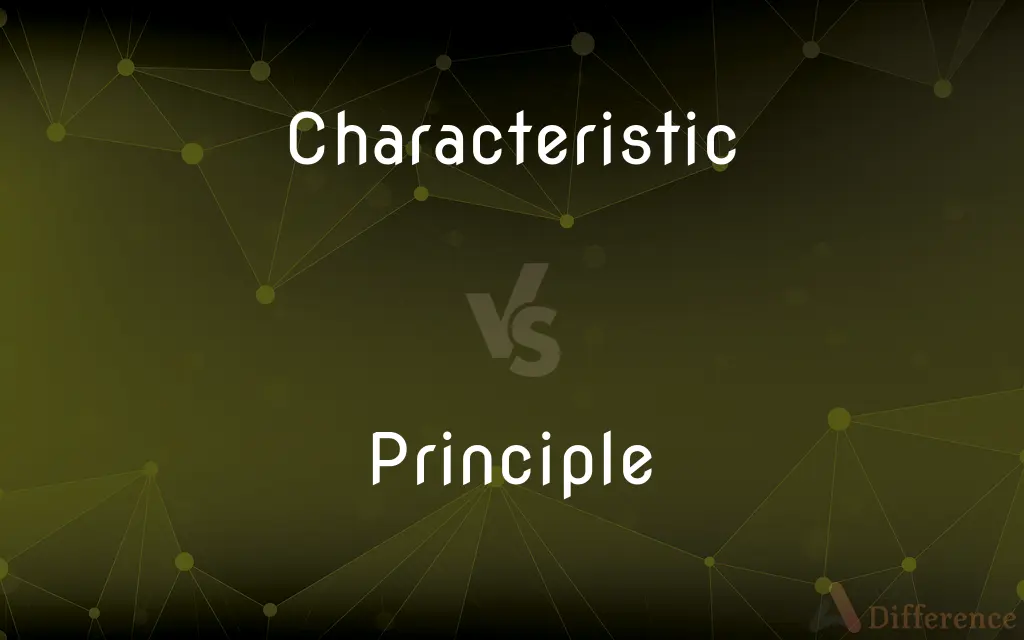Characteristic vs. Principle — What's the Difference?
By Tayyaba Rehman — Updated on October 6, 2023
Characteristic is a defining trait or feature; Principle is a fundamental belief or rule.

Difference Between Characteristic and Principle
Table of Contents
ADVERTISEMENT
Key Differences
A Characteristic often refers to a specific trait, quality, or feature that defines an entity or individual. This can relate to physical attributes, behavior, or any other observable feature. On the other hand, a Principle typically refers to a foundational belief, rule, or guideline that shapes decisions or actions. It acts as a directive that helps govern behavior.
While a Characteristic is something one might observe, a Principle is something one might follow.
For instance, the characteristic of a car might be its color, while a principle guiding a car's design might be energy efficiency. Another way to look at it is that a characteristic is what makes something recognizable, while a principle is what guides or directs action based on a set of beliefs or standards.
Lastly, while Characteristics can be intrinsic or extrinsic, Principles are often abstract, acting as touchstones for behavior or decision-making.
Comparison Chart
Definition
A distinguishing trait or feature.
A fundamental belief or rule.
ADVERTISEMENT
Nature
Observable.
Abstract.
Function
Describes or identifies.
Guides or directs action.
Relatability
Specific to an entity or individual.
Universal or applicable in many contexts.
Usage
Can be intrinsic or extrinsic.
Often serves as a foundational standard.
Compare with Definitions
Characteristic
A distinguishing feature or quality.
The blue hue of her eyes is a prominent characteristic.
Principle
A rule or law concerning a natural phenomenon.
The greenhouse effect is based on the principle that certain gases trap heat.
Characteristic
A unique trait that sets someone or something apart.
His tenacity is a characteristic that has led him to success.
Principle
A basic idea or rule that explains or controls how something happens or works.
Newton's first law of motion is a principle that describes the behavior of objects at rest.
Characteristic
A recognizable sign or feature of an entity.
The sweet aroma is a characteristic of this particular fruit.
Principle
A moral rule or belief governing one's behavior.
She always stands by her principle of telling the truth, no matter the consequence.
Characteristic
A mark or feature helping in identification.
The spots on a cheetah are a defining characteristic.
Principle
An accepted or professed rule of action or conduct.
On principle, he refuses to pay for products that are not ethically produced.
Characteristic
An attribute that is typical of a person, group, or thing.
It's a characteristic of this breed of dogs to be extremely loyal.
Principle
A principle is a proposition or value that is a guide for behavior or evaluation. In law, it is a rule that has to be or usually is to be followed.
Characteristic
Typical of a particular person, place, or thing
He began with a characteristic attack on extremism
Principle
A fundamental truth or proposition that serves as the foundation for a system of belief or behaviour or for a chain of reasoning
The basic principles of justice
Characteristic
A feature or quality belonging typically to a person, place, or thing and serving to identify them
Certain defining characteristics of the school emerge from the study
Principle
A general scientific theorem or law that has numerous special applications across a wide field.
Characteristic
The whole number or integral part of a logarithm, which gives the order of magnitude of the original number.
Principle
A fundamental source or basis of something
The first principle of all things was water
Characteristic
Being a feature that helps to distinguish a person or thing; distinctive
Heard my friend's characteristic laugh.
The stripes that are characteristic of the zebra.
Principle
A basic truth, law, or assumption
The principles of democracy.
Characteristic
A feature that helps to identify, tell apart, or describe recognizably; a distinguishing mark or trait.
Principle
A rule or standard, especially of good behavior
A man of principle.
Characteristic
(Mathematics) The integral part of a logarithm as distinguished from the mantissa
The characteristic of the logarithm 6.3214 is 6.
Principle
The collectivity of moral or ethical standards or judgments
A decision based on principle rather than expediency.
Characteristic
(Mathematics) The least number of times the multiplicative identity in a ring needs to be added to itself to reach the additive identity, or, if the additive identity is never reached, zero. The integers have a characteristic of zero; the integers modulo 12 have a characteristic of 12.
Principle
A fixed or predetermined policy or mode of action.
Characteristic
Being a distinguishing feature of a person or thing.
Principle
A basic or essential quality or element determining intrinsic nature or characteristic behavior
The principle of self-preservation.
Characteristic
A distinguishing feature of a person or thing.
Principle
A rule or law concerning the functioning of natural phenomena or mechanical processes
The principle of jet propulsion.
Characteristic
(mathematics) The integer part of a logarithm.
Principle
(Chemistry) One of the elements that compose a substance, especially one that gives some special quality or effect.
Characteristic
(nautical) The distinguishing features of a navigational light on a lighthouse etc by which it can be identified (colour, pattern of flashes etc.).
Principle
A basic source. See Usage Note at principal.
Characteristic
For a given field or ring, a natural number that is either the smallest positive number n such that n instances of the multiplicative identity (1) summed together yield the additive identity (0) or, if no such number exists, the number 0.
The characteristic of a field, if non-zero, must be a prime number.
Principle
A fundamental assumption or guiding belief.
We need some sort of principles to reason from.
Characteristic
Pertaining to, or serving to constitute, the character; showing the character, or distinctive qualities or traits, of a person or thing; peculiar; distinctive.
Characteristic clearness of temper.
Principle
A rule used to choose among solutions to a problem.
The principle of least privilege holds that a process should only receive the permissions it needs.
Characteristic
A distinguishing trait, quality, or property; an element of character; that which characterized.
The characteristics of a true critic.
Principle
Moral rule or aspect.
I don't doubt your principles.
You are clearly a person of principle.
It's the principle of the thing; I won't do business with someone I can't trust.
Characteristic
The integral part (whether positive or negative) of a logarithm.
Principle
(physics) A rule or law of nature, or the basic idea on how the laws of nature are applied.
Bernoulli's Principle
The Pauli Exclusion Principle prevents two fermions from occupying the same state.
The principle of the internal combustion engine
Characteristic
A prominent aspect of something;
The map showed roads and other features
Generosity is one of his best characteristics
Principle
A fundamental essence, particularly one producing a given quality.
Many believe that life is the result of some vital principle.
Characteristic
A distinguishing quality
Principle
A source, or origin; that from which anything proceeds; fundamental substance or energy; primordial substance; ultimate element, or cause.
Characteristic
The integer part (positive or negative) of the representation of a logarithm; in the expression log 643 = 2.808 the characteristic is 2
Principle
An original faculty or endowment.
Characteristic
Any measurable property of a device measured under closely specified conditions
Principle
(obsolete) A beginning.
Characteristic
Typical or distinctive;
Heard my friend's characteristic laugh
Red and gold are the characteristic colors of autumn
Stripes characteristic of the zebra
Principle
(transitive) To equip with principles; to establish, or fix, in certain principles; to impress with any tenet or rule of conduct.
Principle
Beginning; commencement.
Doubting sad end of principle unsound.
Principle
A source, or origin; that from which anything proceeds; fundamental substance or energy; primordial substance; ultimate element, or cause.
The soul of man is an active principle.
Principle
An original faculty or endowment.
Nature in your principles hath set [benignity].
Those active principles whose direct and ultimate object is the communication either of enjoyment or suffering.
Principle
A fundamental truth; a comprehensive law or doctrine, from which others are derived, or on which others are founded; a general truth; an elementary proposition; a maxim; an axiom; a postulate.
Therefore, leaving the principles of the doctrine of Christ, let us go on unto perfection.
A good principle, not rightly understood, may prove as hurtful as a bad.
Principle
A settled rule of action; a governing law of conduct; an opinion or belief which exercises a directing influence on the life and behavior; a rule (usually, a right rule) of conduct consistently directing one's actions; as, a person of no principle.
All kinds of dishonesty destroy our pretenses to an honest principle of mind.
Principle
Any original inherent constituent which characterizes a substance, or gives it its essential properties, and which can usually be separated by analysis; - applied especially to drugs, plant extracts, etc.
Cathartine is the bitter, purgative principle of senna.
Principle
To equip with principles; to establish, or fix, in certain principles; to impress with any tenet, or rule of conduct, good or ill.
Governors should be well principled.
Let an enthusiast be principled that he or his teacher is inspired.
Principle
A basic generalization that is accepted as true and that can be used as a basis for reasoning or conduct;
Their principles of composition characterized all their works
Principle
A rule or standard especially of good behavior;
A man of principle
He will not violate his principles
Principle
A basic truth or law or assumption;
The principles of democracy
Principle
A rule or law concerning a natural phenomenon or the function of a complex system;
The principle of the conservation of mass
The principle of jet propulsion
The right-hand rule for inductive fields
Principle
Rule of personal conduct
Principle
(law) an explanation of the fundamental reasons (especially an explanation of the working of some device in terms of laws of nature);
The rationale for capital punishment
The principles of internal-combustion engines
Principle
A fundamental truth or proposition.
The principle of equality is paramount in a democratic society.
Common Curiosities
Are all characteristics inherent?
No, some characteristics are acquired over time or due to external influences.
Can an individual's characteristics define their principles?
Not directly; while characteristics describe observable traits, principles define underlying beliefs or rules.
Do principles always have a moral connotation?
No, while many principles relate to morals or ethics, they can also describe fundamental truths in other areas.
What is a Characteristic?
A distinguishing feature or quality of someone or something.
Are principles universal?
Some principles, especially scientific or mathematical ones, are universal, but moral or ethical principles may vary among cultures.
How does Characteristic differ from Principle?
A Characteristic describes a trait or feature, while a Principle is a fundamental truth or rule.
Can a characteristic be both physical and behavioral?
Yes, for example, someone's smile (physical) and their kindness (behavioral) are both characteristics.
How is a characteristic determined in a study?
In a study, characteristics are often identified through observation, measurement, or data analysis.
Can a thing or concept have both characteristics and principles associated with it?
Yes, for example, a business might have certain characteristics (size, products) and operate on certain principles (ethics, mission).
How can principles be applied in daily life?
Principles can guide one's actions, decisions, and behaviors based on foundational beliefs or truths.
Are principles always abstract?
Mostly yes, as they often represent intangible truths or beliefs, but they can have concrete applications.
Is every characteristic important for identification?
Not necessarily. While some are defining, others might be more subtle or common.
Can two things have the same characteristic but different principles?
Yes, for instance, two organizations might have a similar structure (characteristic) but operate on different ethical guidelines (principles).
Is it possible for an entity's characteristics to change over time?
Yes, some characteristics can evolve due to various factors like environment, experience, or growth.
How are principles different from rules?
While both can guide actions, principles are foundational beliefs, whereas rules are specific directives.
Share Your Discovery

Previous Comparison
Categorically vs. Unequivocally
Next Comparison
Within vs. WithAuthor Spotlight
Written by
Tayyaba RehmanTayyaba Rehman is a distinguished writer, currently serving as a primary contributor to askdifference.com. As a researcher in semantics and etymology, Tayyaba's passion for the complexity of languages and their distinctions has found a perfect home on the platform. Tayyaba delves into the intricacies of language, distinguishing between commonly confused words and phrases, thereby providing clarity for readers worldwide.















































